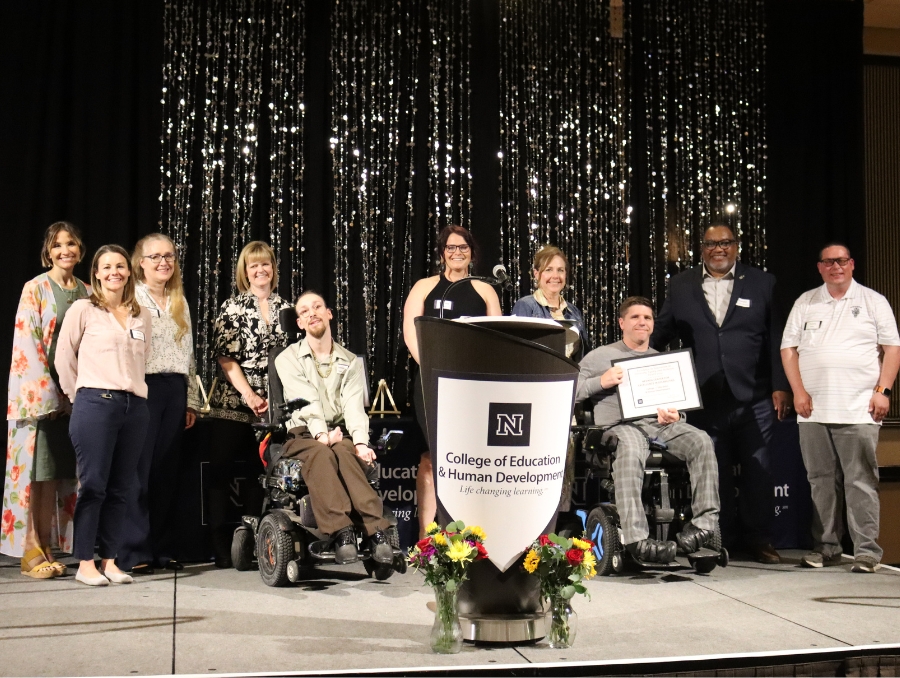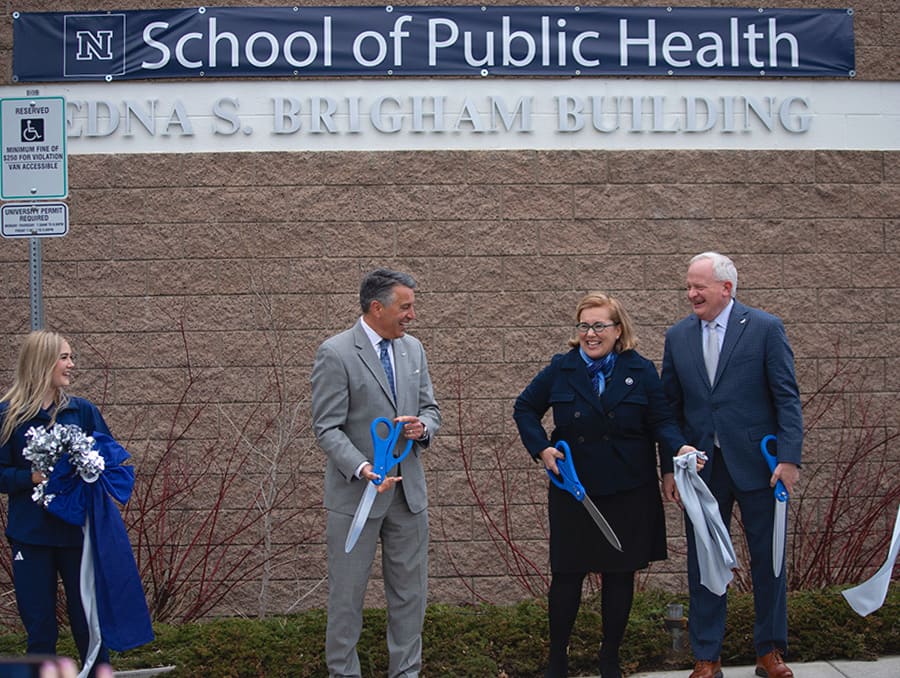University of Nevada, Reno President Milt Glick mixed a sense of pride for the accomplishments of the faculty, students and staff of the institution over the past year with an equally sober sense of reality as the campus faces another round of budget reductions, during his Town Hall Address on Wednesday.
"I still believe that what we do will determine the quality of life for all Nevadans," Glick said during his 80-minute presentation before a crowd of about 300 in the Grand Ballroom of the Joe Crowley Student Union, as well as an online audience of more than 300.
Glick stressed that in a time that has seen the University reduce its budget by more than $44 million, eliminate 414 budgeted positions and close 23 degrees and close or sharply reduce another 29 programs, the achievements of the University during the past year have been impressive.
He noted that the University has reached all-time highs in enrollment (17,679 students in fall 2010); freshmen (2,764 students, a 27 percent increase over the previous year); and graduates (3,109 graduated in 2010); and is now retaining 80 percent of first-time students - five percent higher than the national average. Later in his address he also said that over the past decade, the campus has increased the number of baccalaureate degrees awarded by 66 percent.
Glick said he understood the additional work caused by the budget reductions and that faculty and staff had clearly stepped up to continue to provide a quality education for the students.
"I look at these accomplishments," he said, "and I am grateful for your efforts."
At the same time, however, Glick said the University could be facing a $59-million budget reduction by FY 2013, based on general fund appropriation levels contained in the executive budget proposal of the state.
He said that while people may quibble over percentage reductions and what they may mean to the University's budget, "The bottom line is, our more direct problem is, how do we take $59 million from our budget and maintain our quality and our credibility?"
Glick stressed that the University will be making a strong case to the state's leadership, emphasizing the University's value to the Governor's agenda of economic development and job creation.
"We are the anchor," he said of the University's role in developing a more diversified economy and creating more jobs in the state. He cited the University's ability to produce a more educated workforce, to create new ideas and discovery through a research enterprise that represents about half of all research in the Nevada System of Higher Education, a University outreach presence that stretches to all 17 counties, and tech transfer efforts that help turn discovery into practical use for the state and the nation.
He said the University must continue to make strong strides toward improving retention and graduation rates. A strengthened partnership with the Washoe County School District to improve college readiness and decrease the need for remediation is key, as is the University's commitment to Complete College America goals of producing a more educated populace for a state that ranks at or near the bottom of almost every educational achievement metric imaginable.
"We are not creating the society we all want to live in if we don't turn this around," he said.
Glick used the University's recent elevation to Tier I status in the U.S. World & News Report "Best Colleges" rankings as a clear example of the University's success in areas that matter most to Nevadans.
He said that often universities achieve such status through the "beauty contest" of university presidents or provosts who cast votes for institutions they know little about other than name awareness. The University's Tier I ranking, however, came about through what Glick called "measurable metrics" such as improved graduation and retention rates.
"We did it the old-fashioned way," he said of the ranking. "We earned it."
Glick also praised the University's faculty, students and staff for accomplishing so much during a time that has seen the University's general fund appropriation drop from $220 million in FY09 to $175 million in FY11.
He said that while businesses have also cut, necessitating that "businesses are doing less with less ... we are doing more with less."
He cautioned, however, that the upcoming budget reduction could have an even greater impact on the University than earlier rounds.
While previously he had said that cuts were painful and difficult, "We didn't change the nature of the institution." Noting he was not advocating proposals to cut salaries and raise tuition, Glick acknowledged they could help bridge the gap somewhat. However, Glick said that in all likelihood, the University would still have with a $40 million budget hole to fill.
"I believe if we take away $40 million, we change the very nature of the institution, and not in a very good way," he said.
Glick said that the campus community can make a difference in the coming weeks and months with the Governor and the Legislature.
"I urge all of you to get engaged," he said. "Make the case for what's good for the state. But even more important, keep doing what you're doing and find ways to improve our outcomes."
In addition to making a strong case for the value of higher education to the state, Glick said the University's legislative agenda would include: maintain a stable base of state funding for the institution; increase institution's flexibility in budgetary and policy areas for maximum accountability and flexibility; retain tuition and fees; initiate support and funding for a statewide economic development model such as Utah's "USTAR" research, innovation and business cluster initiative; preserve the Guinn Millennium Scholarship program; adequate benefits for faculty and staff.
"We are going to make the best possible case to the Governor and the Legislature why cutting higher education in this state is a bad idea," he said.
During the Q&A session that accompanied Glick's address, he answered more than a dozen questions.
Key responses included:
On the timeline of when budget cuts would actually be enacted: "Until we have a budget, we can't make any final decisions" and "Shooting for a July 1 final decision is very desirable, but I don't think we can make all of the decisions we will need to make if we don't have a (final budget number) until June 28. It may go into the fall, given the code and the final numbers we are faced with." For possible academic program cuts, Glick said the campus would more than likely follow the "curricular review" model that was followed during spring 2010 budget reductions.
On the Nevada System of Higher Education consolidating campuses to save money: "(The Regents) have not made any decisions. They've instructed (Chancellor Dan Klaich) to come back with the cost benefits of different models."
On the loss of LOA's during budget reductions: "We've gone from 65 percent to 80 percent of our credit hours being taught by fulltime faculty. I think that's got to make us among the leaders in the country among public universities."
On eliminating athletics: "Right now, we are a Division I-A program. It is part of our identity and our community identity. ... Being a Division I-A program is part of who we are. I believe (athletics) is worth keeping and that is certainly our plan. We must move athletics toward more self-support."
On eliminating the School of Medicine: "We are 48th, 49th or 50th in the nation in ratio of population to doctors. I don't know how you can find that an acceptable thing. I realize the School of Medicine is expensive, but it also generates about 80 percent of its own income. (Elimination) is hard to justify."
On encouraging early retirements: "Right now, we have no plan on incentivizing early retirements."
On tuition increases: "First, it's important to note that for every dollar in tuition that we raise, we set aside 20 cents for financial aid. That said, the bottom line is there is a point in which (because of tuition increases) you do begin to lose students, and if you lose enough of them, your net income decreases."
On building a new residence hall during tough times: Glick noted first that 90 percent of the funding for the new residence hall currently under construction comes from student funds, and that if the University is to continue to retain and graduate students, "We know that students who live in residence halls are more likely to graduate. We believe having more beds and more residence halls on our campus will help increase our graduation rate. ... If the state is serious that we need to produce 50 percent more graduates, then this is what we should do."
On faculty, student and staff advocacy in the legislature this year: "Absolutely. I think this is your University, your community, your state. I would urge you not to personalize this, but to make the case for what's good for this state. I am sure that the governor and the legislature value higher education and do not wish to harm it. We need to continue to improve and to be accountable."
For more information on the budget situation, Glick directed the audience to go to www.unr.edu/budget2011 for regular updates.











